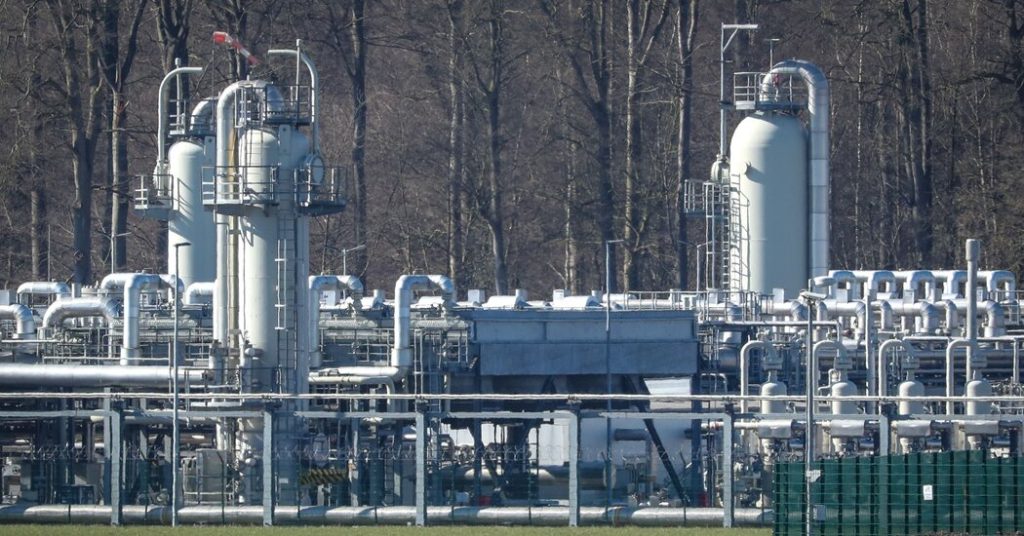Last year, Russia supplied more than half of the natural gas and about a third of all the oil that Germany burned to heat homes and power plants and fuel cars, buses and trucks. Almost half of Germany’s imports of coal, which is essential for steelmaking, came from Russia.
Russian gas, oil and coal are an integral part of the German economy and way of life. The roots are deep.
The first natural gas pipeline connecting what was then West Germany to Siberia was completed in the early 1980s. The legacy of the Cold War can still be seen in eastern Germany’s energy infrastructure, which is still directly linked to Russia, making it difficult to get oil from other suppliers into this part of the country.
Today, those tangles loom as big as European leaders debate Whether energy should be included in more sanctions on Russia amid mounting evidence of atrocities committed by Russian forces against Ukrainian civilians. Officials in Germany, Europe’s largest economy, are caught between anger at Russian aggression and their constant need for the country’s essential goods.
“It was a mistake that Germany became so dependent on energy imports from Russia,” German Finance Minister Christian Lindner said on Tuesday, as he headed to talks with his EU colleagues in Luxembourg.
He indicated that Germany would support a fifth package of sanctions against Russia, including a ban on the import of Russian coal, announced by the European Union president on Tuesday. Ursula von der Leyen. This would be a departure from Berlin’s recent insistence that energy sanctions will hurt Germany more than Russia.
From the heads of leading chemical and steel companies to makers of gummy bears, business leaders have warned that without steady supplies of gas, oil and coal, their production will be halted.
Natural gas heats German homes and generates energy.
Almost half of German homes are heated with natural gas, which is also used for power generation in heavy industries. Powerful German trade unions in the chemical, mining and pharmaceutical sectors have warned that serious cuts in gas imports could lead to significant job losses.
A group of economists at the Leopoldina National Academy of Sciences said in a report last month that a short-term halt to Russian gas delivery would be “manageable” if the country could increase its dependence on other energy sources.
Robert Habeck, Germany’s energy minister, is seeking to do just that, taking trips to Qatar and Washington to secure energy partnerships. Germany’s energy ministry said Germany had already reduced its dependence on gas from Russia by 15 percent, bringing it down to 40 percent in the first three months of the year.
But industry leaders refused to impose sanctions on Russian natural gas. Martin Brudermüller, CEO of BASF, the chemical producer based in southwest Germany, warned that closing the taps could cause “irreparable damage”. He said moving from Russian natural gas to other suppliers or moving to alternative energy sources would require four to five years, not weeks.
Do we want to blindly destroy our national economy? What have we built over decades? “I think such an experiment would be irresponsible,” said Mr. Brudermüller in an interview with the Frankfurter Allgemeine Zeitung last week.
The country’s makers of chocolate, snacks and sweets have also warned that a lack of gas could spell doom for their ability to produce high-energy food.
“Gas is the most important source of energy for most companies in the German confectionery industry,” the German Confectionery Industry Association, OPDSi, said in a statement. “The companies involved in the German confectionery industry produce food, and therefore it is of great importance to supply the population in Germany, especially during food shortages or other emergencies.”
during the Weekend Lithuania It announced that it had halted all gas imports from Russia starting in April. But natural gas accounts for only 11 percent of the energy consumed by the Baltic country of 2.8 million people, while Germany relies on gas for 27 percent of its energy needs.
Just this year the German government pledged €500 million to help build a terminal needed to import LNG directly, as part of efforts to replace the 56 billion cubic meters Germany imports each year from Russia. LNG is an alternative source of natural gas, a means of transporting it across seas over long distances.
In addition to supplying a huge amount of gas, Russia owns and operates thousands of miles of pipelines and several major storage tanks in Germany through subsidiaries of the state-owned energy group, Gazprom. Among them is Astora, which has the largest underground natural gas reservoir in Western Europe.
Mr. Habeck announced on Monday that he would put Gazprom Germany, the parent company of Astora and the main subsidiary of Gazprom in Germany, under state control until at least September. This move was seen as a decisive step in wresting power over gas supplies from Russia’s hands.
Oil passes through Cold War-era routes to Germany.
More than a third of Germany’s refined oil comes from Russia, and much of it flows directly to facilities in the country’s former eastern states via Cold War-era pipelines.
The Russo-Ukrainian War and the Global Economy
So replacing Russian oil means not only finding replacements for a huge amount of crude – Germany bought 27 billion tons from Russia in 2021 – but also figuring out how to move it to those refineries in the east of the country. No pipelines cross the former borders that divided East and West Germany.
Germany has begun to diversify its oil supplies, which has brought the Russian share down to 25 percent from 35 percent in the first three months of this year.
Starting in mid-April, the Leuna refinery in eastern Germany will process half of what it has been in past years of Russian oil. Instead, the Economy Ministry said crude imported from other countries is transported by truck and rail from western Germany.
But the PCK refinery in another eastern German town, Schwedt, is largely owned by Russian energy company Rosneft, which was less willing than Leuna’s refinery to allow Germany to cancel contracts for future oil deliveries from Russia. German media reported that the Energy Ministry is looking into the possibility of justifying the state takeover in the name of energy security.
Reliance on coal has been halved, but Germany still needs Russia.
Coal is the easiest of the three energy sources that can be replaced. However, Germany relied on Russia to provide nearly half of its hard coal imports, after closing the last coal mine at the end of 2018.
The Economy Ministry said that in the past six weeks, Germany was able to change delivery chains and sign new agreements to cut its reliance in half. Now 25 percent of the country’s coal needs are met by Russia. It plans to stop importing fuel completely by the end of the summer.
Until then, however, Mr. Habeck, the Economy Minister, insisted that Germany needed a steady supply of energy to support its role as an economic engine in the region. This may be particularly urgent now that Europe is being asked to help provide energy and supplies to Ukraine, which last month connected its electrical grid to Europe to ensure stability despite the war.
Germany, after some hesitation, was supplying Ukraine with weapons, of which Mr. Habek noted that the steel to be produced in Germany’s factories was coal-fired, which still includes imports from Russia. It was not immediately clear how that coal would be compensated in the event of sanctions.
“We have been asked to supply Ukraine with raw materials,” Mr. Habek told ZDF public television last week. “We need a sound infrastructure to be able to do that.”

“Writer. Evil travel maven. Avid creator. Proud beer expert. Music lover. Explorer.”











More Stories
Jake Sullivan meets Yang Jiechi in Luxembourg, paving the way for a possible meeting between Biden and Xi
The CDC adds 3 places to its “high” risk list, including Mexico and the United Arab Emirates
Wordle 359 June 13 – Struggling with Wordle today? THREE CLUES TO HELP ANSWER | Games | entertainment